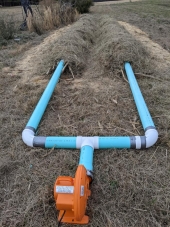
 1
1




West of Denver, Colorado @ 8,000'
Zone 4(ish)... Summers are still brutal!
 1
1








"Study books and observe nature; if they do not agree, throw away the books." ~ William A. Albrecht
 1
1




Invasive plants are Earth's way of insisting we notice her medicines. Stephen Herrod Buhner
Everyone learns what works by learning what doesn't work. Stephen Herrod Buhner
 1
1




West of Denver, Colorado @ 8,000'
Zone 4(ish)... Summers are still brutal!





 2
2




S. Marshall wrote:I’m curious why that may be better than cow manure, is it just easier to handle?
 2
2




L johnson said, "I do not know how bears will react to bokashi. Do they like fermented food?
Invasive plants are Earth's way of insisting we notice her medicines. Stephen Herrod Buhner
Everyone learns what works by learning what doesn't work. Stephen Herrod Buhner




West of Denver, Colorado @ 8,000'
Zone 4(ish)... Summers are still brutal!




 1
1




When in doubt, doubt the doubt.
 1
1








West of Denver, Colorado @ 8,000'
Zone 4(ish)... Summers are still brutal!
 1
1




S. Marshall wrote: I would love to run the drain line of our washing machine. Ideally I would LOVE a complete grey water system for our home, but that would be expensive. For laundry machine grey water has anyone had problems with detergents?
When in doubt, doubt the doubt.




Michael Fundaro wrote:... has phosphates which is a type of fertilizer so it wont/shouldn't hurt the trees. The good thing about the laundry machine is it has a pump so if you connect it to a hose or water pipe (PVC or Pex) it will pump the water a long ways as long as there is a slight downward slope....
West of Denver, Colorado @ 8,000'
Zone 4(ish)... Summers are still brutal!
 2
2








Jim Brewer wrote:I live in the same region and do the same thing for the same reason…
West of Denver, Colorado @ 8,000'
Zone 4(ish)... Summers are still brutal!
 1
1




An important distinction: Permaculture is not the same kind of gardening as organic gardening.
Mediterranean climate hugel trenches, fabuluous clay soil high in nutrients, self-watering containers with hugel layers, keyhole composting with low hugel raised beds, thick Back to Eden Wood chips mulch (distinguished from Bark chips), using as many native plants as possible....all drought tolerant.








S. Marshall wrote:Last spring I inoculated wood chips with Red Wine cap mushroom spawn because I learned that may be the best to help breakdown wood chips. I was told by a friend it took a year before he saw any mushrooms and indeed I haven’t seen any yet.
“There are no words to express the abyss between isolation and having one ally. It may be conceded to the mathematician that four is twice two. But two is not twice one; two is two thousand times one.”
― G. K. Chesterton

|
Let me tell you a story about a man named Jed. He made this tiny ad:
the permaculture bootcamp in winter (plus half-assed holidays)
https://permies.com/t/149839/permaculture-projects/permaculture-bootcamp-winter-assed-holidays
|

